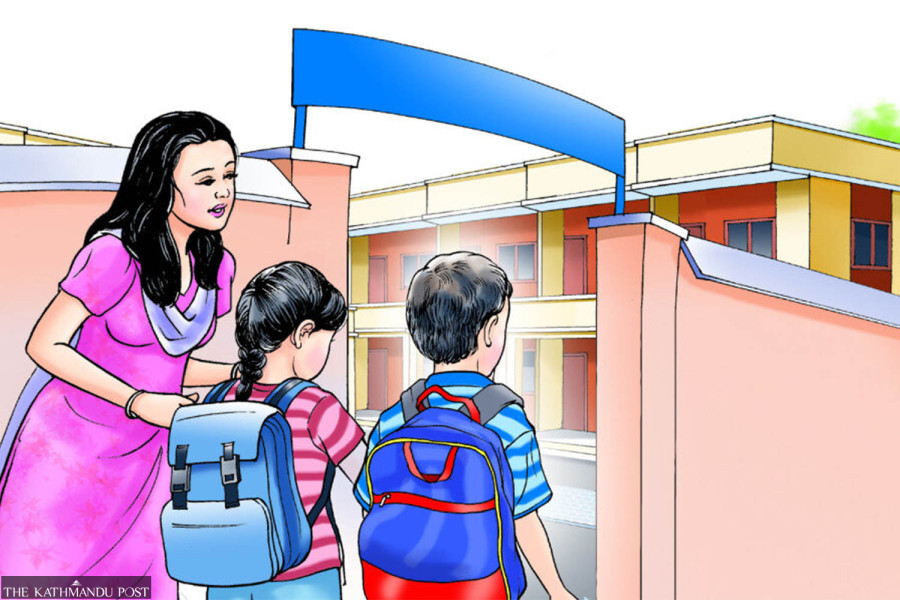National
Issue of converting private schools into trusts resurfaces
House committee begins discussions on School Education Bill that was registered in Parliament last September.
Binod Ghimire
The old debate of whether and when private schools should be converted into trusts has resurfaced with the lawmakers discussing the School Education Bill that has been under consideration in Parliament for a year.
The previous government had in September last year registered the bill in Parliament, leaving it up to the existing private school whether or not to convert into trusts. Reverting from earlier preparations to impose a deadline for the conversion, the bill left it to the discretion of individual private schools.
However, cross-party lawmakers have registered amendments to the bill with provisions to set a deadline for such conversions. On Wednesday, the Education, Health and Information Technology Committee of the House of Representatives began thorough discussions on the bill, with members strongly advocating a maximum of 12 years for all private schools to convert into trusts.
Taking part in the discussions on Thursday, the leaders of the main opposition CPN (Maoist Centre) said no commercial schools should be permitted to continue to operate in the country, whose constitution directs a policy shift towards socialism.
Madhav Sapakota, a Maoist member on the committee, said a deadline is necessary to convert commercial private schools into service-oriented institutions. “Our constitution has no space for profit-making schools. Time has come to set a deadline to convert private schools from companies into trusts. Let’s do it in 12 years if not 10 years, but no more excuses.”
Lawmakers from the Maoist Centre have registered 25 amendments to the bill.
The ruling CPN-UML has a similar position. Commenting on the bill, UML lawmaker Gokul Baskota said if someone has made an investment in schools, they should be given time to recover the investment before the schools’ conversion into trusts. “We can give them seven years. But there should be no ifs and buts about their conversion,” he said.
Conversion into trust means that the school owners cannot divide profits. Currently, most private schools operate as companies after registering with the Company Registrar’s Office.
The agenda of turning private schools into public ones was first floated by a High Level Education Commission five years back.
In August 2018, the government formed a 25-member commission led by Education Minister Giriraj Mani Pokharel. It involved education experts, representatives from teachers’ and private schools’ associations and officials in the task of recommending the government on its education policy.
The commission prepared a report after rigorous discussions and consultations with the stakeholders. On January 15, 2019, it was submitted to then-prime minister KP Sharma Oli who has been reappointed to the position.
However, Oli was not interested in implementing the recommendations, so he never made the report public. His successor, Sher Bahadur Deuba, also maintained a similar policy.
The commission recommended that private schools be converted into trusts within 10 years. This would, according to the commission, stop the commercialisation of education.
The commission based its recommendations on Article 31(2) of the constitution, which makes the state responsible for ensuring compulsory basic and free secondary education for all. The commission said that leaving private educators to “generate profit”, as they are currently doing, would violate the constitutional spirit.
Private school operators objected to the suggested measure. They had tried to put pressure on the commission to exclude it while the report was being finalised.
A federal education Act is necessary to implement the educational provisions enshrined in the Constitution. In its absence, the devolution of the authority to the local and provincial levels has not been possible. Despite commitments from successive governments, it took around eight years for the bill to be finalised.
The bill under consideration envisions the national-level board exams to be conducted only at the end of grade 12. It doesn’t mention the Secondary Education Examinations, which means respective schools will administer the tests. The local units will hold the grade eight tests, though the district education offices will prepare the question sets.
Lawmakers participating in the discussions on Thursday also demanded a provision to ban teacher unions. “The quality of education has deteriorated as the teachers are in politics in the name of trade unions. This needs to stop,” said Amresh Kumar Singh, an independent lawmaker.




 9.83°C Kathmandu
9.83°C Kathmandu














